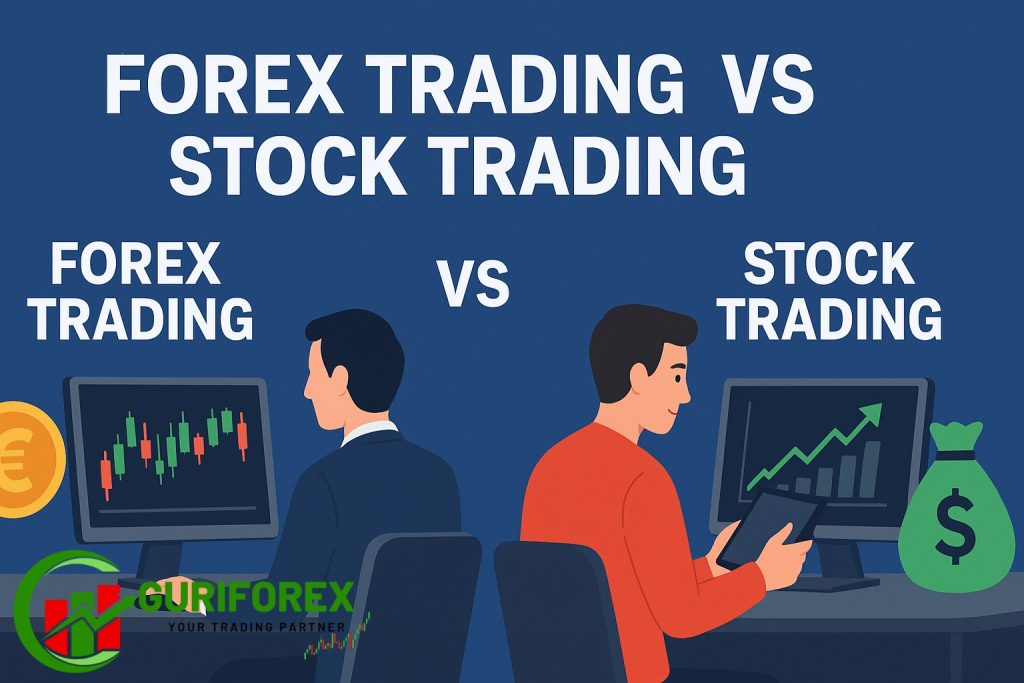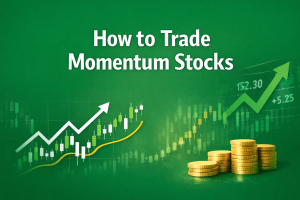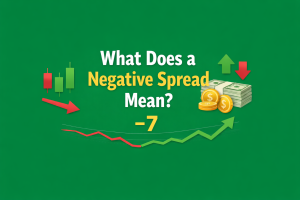Forex Trading vs Stock Trading: Which is More Profitable in 2025?
When people first think about investing, one of the biggest questions is about forex trading vs stock trading. Both markets can bring opportunities, but they work very differently. To truly understand forex trading vs stock market, you need to look at their size, trading styles, risks, and profitability.
Forex vs Stock Trading: A General Comparison
or beginners, the debate between trading forex vs stocks often comes down to lifestyle and goals. Stock trading vs forex trading is usually about patience versus speed. Stocks are tied to companies and economies, while forex depends on currencies and global events. Many traders wonder, forex vs stocks which to choose, but the answer depends on your risk level and learning curve.
From my own journey, I found stock vs forex slower but more stable, while forex offered faster returns but required more focus. If you’re asking forex vs stocks which is better, the truth is both can work—but your personality matters more.
Profitability & Returns
When we compare forex trading vs stock trading which is more profitable, the numbers tell a story. Forex offers high leverage, meaning small moves can bring big gains—but also big losses. Forex vs stock returns are different because forex focuses on short-term movements, while stocks often reward long-term holders.
Looking at forex vs stocks growth opportunities, stocks give dividends and company growth, while forex profits mostly from price movement. A forex vs stocks profitability analysis shows that forex might look attractive for fast income, but stocks build wealth steadily over time.
Trading Styles & Strategies
The style of trading also changes your choice. Day trading forex vs stocks usually favors forex because of its constant movement. For those who like flexibility, forex vs stocks swing trading can work on both markets, but forex gives more frequent setups. If you want speed, forex vs stocks scalping is common in currencies, while stock traders may prefer options trading vs forex for flexibility.
In short, there are many forex vs stocks trading strategies, but success depends on discipline rather than the market itself.
Beginners & Education
For learners, forex vs stocks for beginners can feel overwhelming. Forex seems simpler because you only trade currency pairs, but it requires strong risk management. Forex vs stocks trading for beginners usually starts with demo accounts, learning charts, and practicing small trades.
As a mentor once told me, forex vs stock for beginners is more about managing emotions than finding the “perfect” market. New traders should explore both before deciding.
Risks, Safety & Volatility
No market is without risk. Forex vs stocks risks differ based on leverage and volatility. Stocks can drop during economic downturns, while forex reacts instantly to news events. The key is to balance forex vs stocks risks and rewards.
If you’re asking, “forex vs stock which is safer?” the answer is stocks are usually safer long term, while forex is riskier short term. Still, forex trading good or bad depends on how prepared you are. With forex vs stocks volatility, forex moves faster, making it exciting but also dangerous.
Market Size, Volume & Liquidity
The forex market is massive. With forex daily trading volume crossing $7 trillion, it easily beats stocks in terms of liquidity. If you ask, “how much money is traded daily on forex?” the answer shows why it attracts so many traders.
Compared to the forex market cap and forex trading volume per day, the stock market is smaller in volume but larger in diversity. A forex vs stocks liquidity comparison makes it clear—currencies win in short-term movement, but stocks hold value in the long run.
Trading Hours & Costs
Another difference is timing. Forex vs stocks market hours show that forex runs 24/5, while stocks are limited to exchange timings. This makes forex vs stocks trading hours more flexible for global traders.
When it comes to costs, forex vs stocks commission comparison shows forex usually has lower fees, but spreads matter. Forex vs stocks leverage comparison reveals forex has higher leverage, while stocks are more conservative. Some traders like forex vs stocks margin trading, but beginners should use caution.
Differences & Market Types
The difference between forex and stock market is simple—stocks represent ownership in a company, while forex is about currency exchange. Some also explore forex vs share trading or forex vs equity trading, but the basics remain the same.
If you’re looking at alternatives, forex and commodity trading is another area where traders hedge against inflation. In terms of equity vs commodity, stocks represent growth, while commodities represent value preservation.
Bonus Advice
Successful trading isn’t only about charts and strategies—it also requires mental clarity and discipline. Staying fit and maintaining balance in life can improve your decision-making skills as a trader. For a practical tool, try the Lean Body Mass Calculator to track your health while you grow in your trading journey.
Quick Comparison Table
Feature | Forex | Stocks |
Liquidity | Very High (forex vs stocks liquidity) | High but lower than forex |
Market Hours | 24/5 (forex vs stocks market hours) | Limited to exchange hours |
Profitability | Short-term gains (forex vs stocks profitability) | Long-term growth (forex vs stock growth potential) |
Risk | High (forex vs stocks risks) | Moderate (forex vs stock which is safer) |
Volume | $7+ Trillion daily (forex daily volume) | Billions daily (forex vs stocks trading volume) |
Strategies | Scalping, day trading (forex vs stocks scalping) | Swing trading, options (options trading vs forex) |
Disclaimer
This article presents a general comparison between forex trading and stock trading for informational purposes only. Profitability varies based on market conditions, trader experience, risk tolerance, and capital management. Past performance in either market does not guarantee future results. Always conduct your own research and seek professional advice before choosing a trading market.





2 thoughts on “Forex Trading vs Stock Trading: Which is More Profitable?”
Pingback: Why Stop Outs Happen and How They Can Wipe Out Your Trading Account
Pingback: How to Trade Momentum Stocks: A Proven Strategy Smart NYSE & NASDAQ Traders Use